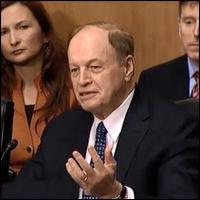Senator Shelby’s Federal Reserve Reform Bill Is Just Moving Deck Chairs on the Titanic

Senator Richard (Dick) Shelby
Senator Richard Shelby, Chair of the Senate Banking Committee, is set to release details of his proposed financial reform legislation today which Wall Street hopes will have so much smoke and mirrors to appease the liberal and conservative factions on the Committee that no one will notice that it’s another big sellout to Wall Street.
The bill will hold out the promise of reforming the Federal Reserve while failing to do anything material to reform it. It will promise to remove unnecessary regulatory burdens on community banks so that they can survive and compete while leaving intact the very financial structure that is killing off community banks faster than you can say Dodd-Frank.
The biggest joke in the proposed legislation is that the Fed will somehow be tamed by allowing the President of the United States to nominate, with Senate confirmation, the President of the New York Fed – the organization that is effectively running the Fed from New York by following the marching orders of the mega Wall Street banks. President Obama’s nominations, with Senate confirmation, have not exactly been a boon to the American people when it comes to other overseers of Wall Street like the Treasury Secretary, the SEC Chair, or the Vice Chairman of the Federal Reserve – all of whom had egregious Wall Street conflicts but were installed anyway.
According to leaks, Shelby’s bill will propose a dramatic increase in the amount of consolidated assets required to designate a bank a “systemically important financial institution” or SIFI. According to rumors, that amount may go from the current $50 billion to potentially $500 billion. While that would relieve some banks of burdensome regulatory filings, it won’t materially change the competitive landscape. Here’s why.
As of June 30 of last year, Bank of America had 5,096 branches spread across the country holding $1.172 trillion in deposits. JPMorgan Chase had 5,682 branches holding $1.079 trillion in deposits. Wells Fargo had 6,314 branches with $1.073 trillion in deposits. With that quantity of branches dwarfing all other banks, backed by multi-million dollar ad campaigns, these mega banks are effectively giant money vacuums, sucking up deposits and making it almost impossible for community banks to compete.
That concentrated money and power then corrupts the financing of campaigns to place more Wall Street cronies in Congress to prevent any meaningful financial reform.
Because these same mega banks are also making wild gambles in exotic derivatives for the house (no, the Volcker Rule has not been implemented, six years after the crash) it means the insured-deposits of the middle class have become wagers against the interests of the same middle class. The London Whale is a case study in this form of hubris.

